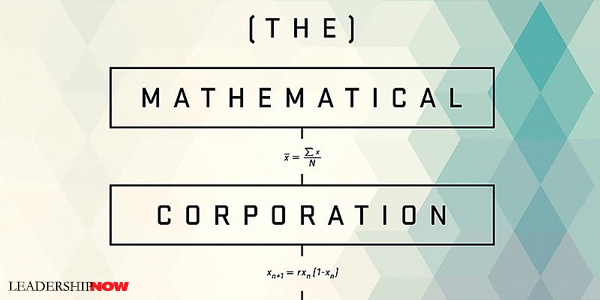 |
 |
07.10.17

The Mathematical Corporation
Y A mathematical corporation is one that takes advantage of machine intelligence by collaborating with it to achieve leading-edge results. It will require a shift in your thinking. “As a leader,” say Josh Sullivan and Angela Zutavern in The Mathematical Corporation, “you need to evolve your focus to excelling through imagination, creativity, reasoning, and problem structuring.” Leading in the era of the mathematical corporation means learning to work with the machine to investigate mountains of data not by braking them down, but by keeping them together to mine insights never before imaginable. It means being able to distinguish what machines are good at doing from what people are good at doing. When people and machines are appropriately paired we can explore heretofore impossible strategies and execute incredible solutions. Machines will not replace people but we will need to develop and capitalize on some uniquely human skills. “People will continue to be better than machines at many of the loftiest cognitive tasks, like asking questions to clarify a problem, composing experiments to test hypotheses, and drawing on truths in one discipline to elicit insights in another.” Because of the machine’s ability to synthesize vast amounts of data, it would be wise to question your own judgments when machines offer a different conclusion from your own. Machines, for example, can recognize patterns better than we can. That said, “computers don’t know the cause of a pattern. They don’t have the human appetite to get to the bottom of the matter, and they don’t ask, ‘Just how does cause A lead to effect B?’ They learn, infer, and have high recall accuracy, but they don’t know the story of cause and effect. So, the task of taking a cause-and-effect understanding of a business system and crafting a strategy from it remains a people job.” Getting the Questions Right While Big Data adds complexity, it is only a problem if you don’t know how to mine it for value. The key skill for leaders is to be able to ask better questions than to offer solutions. Asking the right questions is critical. Poor questions lead to questionable insights. “That’s why as a leader, you need to remain at the tip of the process, seeing the world in a much broader and more differentiated way than others.” Not only asking the right questions but removing our own biases from them, will bring us breakthrough insights and more nuanced answers. Another issue we will have to work through is not projecting our limitations and constraints on the machine. Although we have a mental model that we filter the world though, we must be careful not to constrain the machine—our questions—in the same way. What About Intuition? In the mathematical corporation, the role intuition will shift from judging reality to judging models. “No matter your feeling on intuition, its role is destined to shift to a smaller, if still critical position. As machine intelligence converts implicit understanding to exploit facts, replaces implicit assumptions with data-givens, counters biases with hard evidence, we have to admit the superiority of the cold facts encoded in 1s and 0s.” Often it will require a leap of faith on our part. We will need to learn to ask bigger questions and questions that will lead us to better questions. The best machine collaborators will see this as a learning journey. “Conventional strategic planning practice calls for a relentless search for answers during a detailed analysis of context and a relentless analysis of the opportunity to find the right answer in one go. But when the answer is over the horizon, no amount of analysis of the landscape up front will reveal it. You need to go on a learning journey—sailing to the far shores to find the best answer.” It requires a commitment to a cycle of questioning and learning, questioning and learning. As digital technologies continue to develop and improve, leaders will need to become wise and discerning leaders of machines. Leaders will not only be expected to use this technology to their advantage to solve their own organizational issue but to help answers the questions that exist beyond their own walls.   
Posted by Michael McKinney at 05:24 PM
|
BUILD YOUR KNOWLEDGE
 

How to Do Your Start-Up Right STRAIGHT TALK FOR START-UPS 
Grow Your Leadership Skills NEW AND UPCOMING LEADERSHIP BOOKS 
Leadership Minute BITE-SIZE CONCEPTS YOU CAN CHEW ON 
Classic Leadership Books BOOKS TO READ BEFORE YOU LEAD |